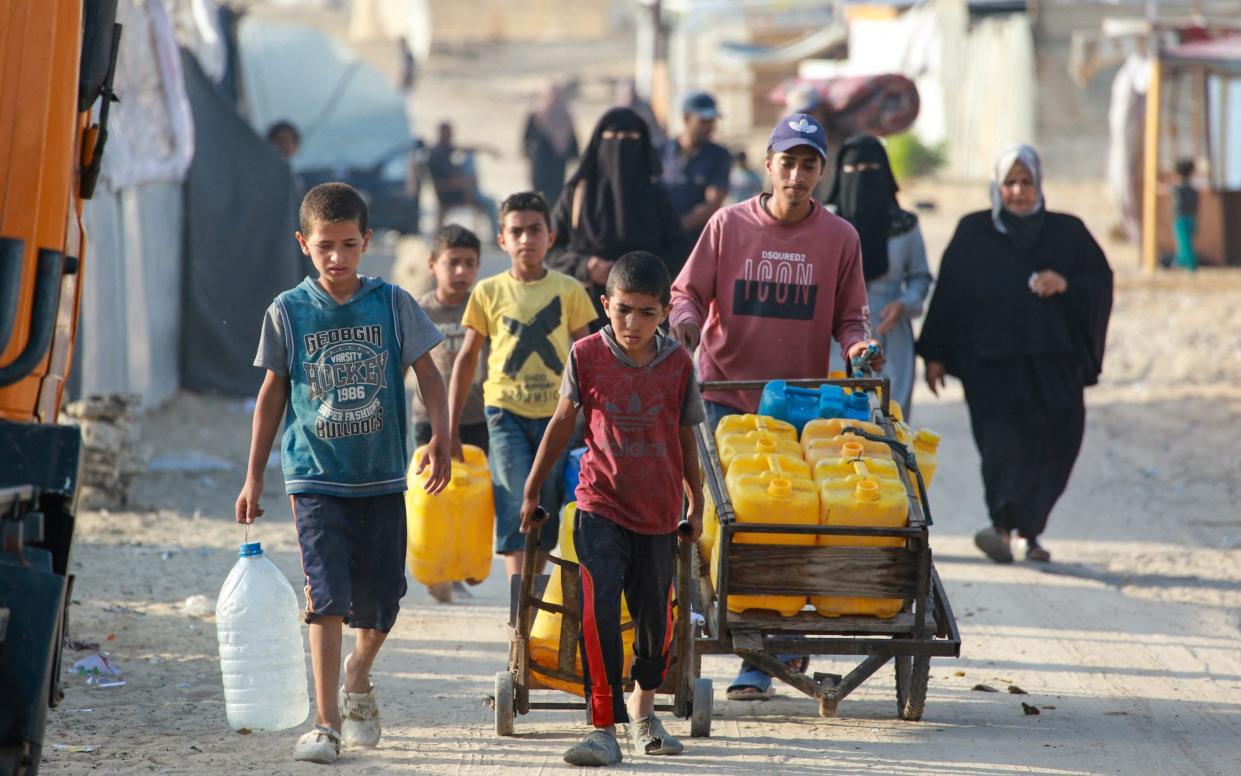BBC accused of anti-Israel bias after incorrect Gaza report

The BBC has been accused of anti-Israel bias after a report about the water crisis in Gaza wrongly claimed a boy with cerebral palsy was “normal” and in “excellent health” before the war.
The online article portrayed the acutely ill nine-year-old as only suffering from malnutrition and dehydration, making no mention of his life-long condition.
The story was pulled from the website on Friday and rewritten before being republished with a note explaining how the original article had not been clear.
The first version of the article, seen by The Telegraph, began by describing Yunis as “stretched out, semi-unconscious” in hospital “his twisted frame” being “hard to look at”.
Speaking from the boy’s hospital bedside in Khan Younis, Gaza, his mother, Ghanima Jumaa is quoted as saying: “My son was in excellent health before, he was normal.
“But when he developed this malnutrition and dehydration, he became as you see him now.”
The second version removed any suggestion he was in “excellent health” before the war and made clear that he also had cerebral palsy, explaining that the condition had been “dramatically worsened” owing to the eight months of war.
A note at the bottom of the new report explained how the original article may have wrongly given the impression that Yunis did not have any prior severe health conditions.
‘Unaware’ of condition
It added that the BBC was “unaware” of his condition when the story was first published.
A picture of Yunis Jamaa with a caption describing him as “suffering from dehydration and malnutrition” used in the original article was not included in the revised version.
Danny Cohen, the former director of BBC Television, said the original article was another example of “misreporting” over the conflict which suggested the BBC has an anti-Israel agenda.
“This is yet another egregious example of the BBC’s misreporting of the Israel-Gaza conflict,” Mr Cohen said. “Many in the Jewish community will inevitably ask why this keeps happening and why the BBC’s ongoing errors all point in the same anti-Israel direction.”
The corporation was contacted after CBC News published a similar story highlighting the plight of malnourished children in Gaza caused by the failure to get humanitarian aid into the city.
While that report included pictures of Yunis and quotes from his mother, it made clear the child had cerebral palsy and was meant to have been transferred to Turkey to treat his malnutrition but the border crossing to Egypt had closed, leaving him stuck in Gaza.
The note at the bottom of the revised BBC article says: “Amended: This story originally reported on the health of Yunis Jumaa while including quotes which could be taken by readers to suggest that he has no pre-existing health conditions.
“The article has been updated to reflect that Yunis has cerebral palsy, which the BBC was unaware of at the time of publication, and to explain that children with pre-existing conditions are especially hard hit by malnutrition and contaminated water.”
Previous health condition
A BBC spokeswoman said: “When we received new information about the previous health condition of the boy we updated the article accordingly and transparently.”
The article was filed from Jerusalem by the BBC correspondent Jon Donnison. Mr Donnison was accused of having an anti-Israel bias in October after he said during a live broadcast that it was “hard to see” any other conclusion other than Israel military being behind a devastating blast at a hospital in Gaza.
Jonathan Munro, the deputy chief executive of BBC News, subsequently admitted that the broadcaster’s “language wasn’t quite right” during live reporting.
Mr Munro, who is the director of journalism at the corporation, said: “[Jon Donnison] was wrong to speculate about the cause of the explosion of the hospital.
“At no stage did he actually say it was caused by the Israelis ... but nonetheless, when the impression is left that we’ve speculated, [it] is important to correct that which we’ve done.”
Israel insisted it was not behind that explosion shortly before Joe Biden, the US president, concluded that the missile had most probably been fired from within Gaza and was not connected to the Israeli Defence Force (IDF).
After the report, Deborah Turness, chief executive BBC News and Current Affairs, said: “We posted a correction after we wrongly speculated about the likely cause of the Al-Ahli hospital explosion, as we also did when we misleadingly described pro-Palestinian demonstrations as ‘demonstrations… during which people voiced their backing for Hamas’.”
She added: “In the moments after the Al-Ahli hospital explosion – contrary to many reports – the BBC did not claim that the Israelis were responsible for the attack. We, along with many other reputable media organisations, reported initial claims by Palestinian officials and eye-witnesses at the hospital that this was an Israeli air strike, with hundreds feared dead.
“We attributed the claim to those making it. We quickly sought a response from the IDF. As soon as the Israeli authorities countered those claims, we prominently and consistently reported their position.”

